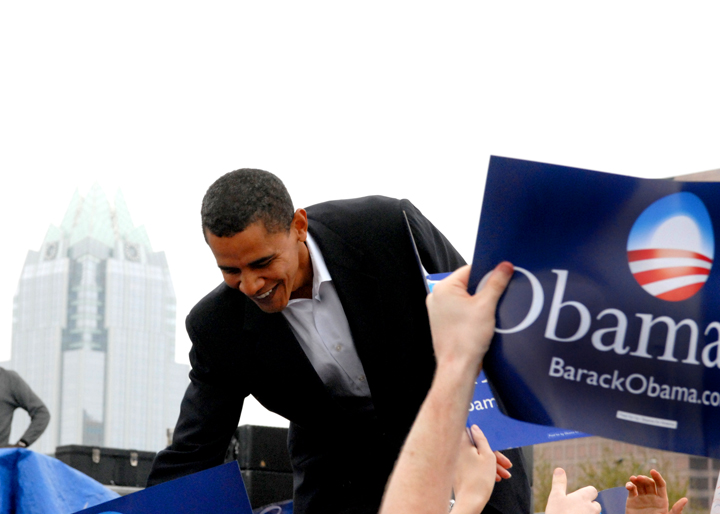| “For that is the true genius of America: that America can change. Our union can be perfected. And what we have already achieved gives us hope for what we can and must achieve tomorrow…” U.S. President-elect Barack Obama, November 5, 2008. |
Change, U.S. President-elect Barack Obama declared in his victory speech, is the true genius of America. Given the historic election of the first black president of the United States, 40 years after Martin Luther King envisioned a Promised Land of racial equality, all would agree that change has come to the United States. Obama’s claim of America’s genius, however, is easier to dispute.
 More than change, America’s true genius lies in its capacity for reinvention and self-renewal. While these words describe a process involving change, specifically they connote a sense of ‘making new again’. That is the soul of America: the hope and optimism not only associated with change, but new beginnings.
More than change, America’s true genius lies in its capacity for reinvention and self-renewal. While these words describe a process involving change, specifically they connote a sense of ‘making new again’. That is the soul of America: the hope and optimism not only associated with change, but new beginnings.
In this sense, Obama is the latest incarnation of that process for reinvention and self-renewal. It is what won him the election. Obama manifests the possibility of racial harmony, inspiring leadership, global responsibility, and above all, a departure from the old—associated with the vastly unpopular George W. Bush Administration (2001-9). Obama, in contrast, represents the radically new, although he does so by embodying a familiar, uniquely American theme: the “American Adam”. A concept originally from the Bible, the American Adam draws on the idea of Adam, the first man God created.
For early Americans who identified their fledgling nation as the ‘New World’, the American Adam was an expression of the authentic American character—a new man for the new (American) Eden. As identified by R.W.B. Lewis, the American Adam is personified by characters in American literature like Huckleberry Finn or Jay Gatsby. This Adamic figure is youthful, optimistic, and naïve, unburdened by the past since none came before him. The American Adam is a ‘he’, and he is in charge of his own destiny. There is an unspoken assumption that he is White.
Like the American Adam, in terms of his political achievements Obama is raw and untested—qualities that associate him with optimism and naivety. Yet Obama is also a radical departure from that personification of America. Unlike the (White) American Adam who remains untarnished because he has no lineage, Obama’s past is saturated by all that came before. While he has no explicit connection to African slavery his Kenyan father, Kansan mother, Muslim stepfather, adolescence in Hawaii (raised by his maternal grandparents) and brief stay in Indonesia all point to the hybrid history of the President-elect.
Unlike the insularity of the American Adam, Obama’s hybridity and unifying rhetoric nurtures the hope that he can reconcile competing interests, proving a bipartisan leader. In other words, by detaching the American Adam from so exclusively White, self-birthing origins, Obama’s brand of reinvention promises to refashion American politics along more inclusive lines.
The result is that there is an almost messianic expectation to the change Obama is expected to bring to the United States and the world. So much is invested in Obama and while his official campaign slogan—“change we can believe in”—is undeniably attractive, the hope it promises will need to be anchored in detailed policies, and soon.
Though a new American Adam, Obama shares the fallibility of the Biblical Adam
In short, it’s easy to forget that Obama is human—and a politician who may promise more than he can possibly deliver. Yet Obama is human. At the risk of sounding cynical so soon after his historic win, we will be reminded of that fact during his time in office. Though a new American Adam, Obama shares the fallibility of the Biblical Adam.
Obama has four, possibly eight years to institute as much change as he can, change that will make a real and lasting difference to people’s lives not only in America, but in the world. There are many challenges ahead—a stalled global economy, wars in Afghanistan and Iraq, and the Arab-Israeli conflict among them. Yet Obama’s conviction that change is possible and that he is ready to confront them is a heady, exciting prospect that I, for one, will be following with great anticipation.
The hope that Obama has mobilised in the electorate among young and old, White, Latino, Jewish, Asian, and Black provides an earthly portrait of a heavenly scene described in the Bible. The Book of Revelation depicts Jesus Christ making all things new and uniting peoples “from every nation, tribe … and language” (Revelation 7:9) In this way, Obama as American Adam prefigures the Christian hope of Jesus as “the last Adam” (1 Corinthians 15:45) who undoes the chronic pattern of sin established by the first, earthly Adam (Romans 5:17-19).
Unlike any earthly Adam, American or otherwise Jesus Christ as the last Adam embodies redemption—renewal that requires no repetition. Though whatever change Obama brings will be welcomed—more than welcome if the Democratic win was anything to go by—Jesus-Christ-as-Adam, as he is presented in the Bible, is alone in being able to deliver ultimate redemption and lasting change in which all can believe.
Justine Toh is a doctoral candidate in Critical and Cultural Studies at Macquarie University. Her research explores Hollywood film and American memorial culture in the light of the September 11, 2001 attacks